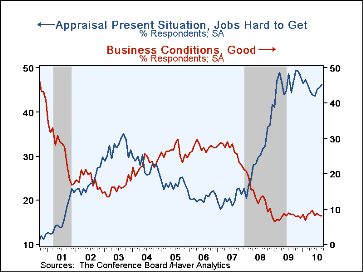 Global| Sep 28 2010
Global| Sep 28 2010U.S. Consumer Confidence Weighed Down By Lowered Expectations
by:Tom Moeller
|in:Economy in Brief
Summary
The Conference Board reported that consumer confidence fell sharply last month to the lowest level since February. The index of overall confidence fell to 48.5 from a downwardly revised 53.2 in August. Moreover, the September level [...]
The Conference Board reported that consumer confidence fell sharply last month to the lowest level since February. The index of overall confidence fell to 48.5 from a downwardly revised 53.2 in August. Moreover, the September level was nearly one-quarter below the May high. Consensus expectations had been for a roughly unchanged reading m/m. During the last ten years there has been an 82% correlation between the level of consumer confidence and the y/y change in real consumer spending. The Conference Board data can be found in Haver's CBDB database.
The September decline in the overall index reflected a 9.2% decline in the expectations component to a level 15.5% below the April high. Nevertheless the index remained more-than-double the recession low. Business conditions in six months were expected to be better by just 14.9% of respondents. More jobs were expected by a reduced 14.5%. Consumers expect the inflation rate in twelve months to be 4.9%, a material decline from recent months' expectations and down from the 2008 high of 7.7%. Interest rates in twelve months were expected to be higher by a lessened 41.9% of respondents, down from the April high of 56.1%, and an increased 18.4% expected rates to fall. A greatly lessened 25.1% of respondents expected stock prices to rise and 35.8% expected prices to fall.
Finally, consumers' assessment of the present situation remained depressed and fell a sharp 7.2% this month after a 5.7% August drop. There's been an increased sense of poor business conditions. Jobs were seen as hard to get by a higher 46.1% of respondents and jobs were seen as plentiful by a lessened 3.8%, still near the series' historic low of 3.1% reached in November. A lessened 8.1% of respondents saw business conditions as good while 46.1% saw them as bad.
Just 1.9% of those surveyed plan to buy a home during the next six months but an increased 27.5% plan to buy a major appliance, still down from the 30.9% who planned to buy one back in 2007. A stable 4.7% plan to buy an automobile and 2.0% plan to buy a new one.
| Conference Board (SA, 1985=100) | September | August | July | Y/Y | 2009 | 2008 | 2007 |
|---|---|---|---|---|---|---|---|
| Consumer Confidence Index | 48.5 | 53.2 | 51.0 | -9.2% | 45.2 | 57.9 | 103.4 |
| Present Situation | 23.1 | 24.9 | 26.4 | 0.4 | 24.0 | 69.9 | 128.8 |
| Expectations | 65.4 | 72.0 | 67.5 | -11.3 | 59.3 | 50.0 | 86.4 |
Tom Moeller
AuthorMore in Author Profile »Prior to joining Haver Analytics in 2000, Mr. Moeller worked as the Economist at Chancellor Capital Management from 1985 to 1999. There, he developed comprehensive economic forecasts and interpreted economic data for equity and fixed income portfolio managers. Also at Chancellor, Mr. Moeller worked as an equity analyst and was responsible for researching and rating companies in the economically sensitive automobile and housing industries for investment in Chancellor’s equity portfolio. Prior to joining Chancellor, Mr. Moeller was an Economist at Citibank from 1979 to 1984. He also analyzed pricing behavior in the metals industry for the Council on Wage and Price Stability in Washington, D.C. In 1999, Mr. Moeller received the award for most accurate forecast from the Forecasters' Club of New York. From 1990 to 1992 he was President of the New York Association for Business Economists. Mr. Moeller earned an M.B.A. in Finance from Fordham University, where he graduated in 1987. He holds a Bachelor of Arts in Economics from George Washington University.










